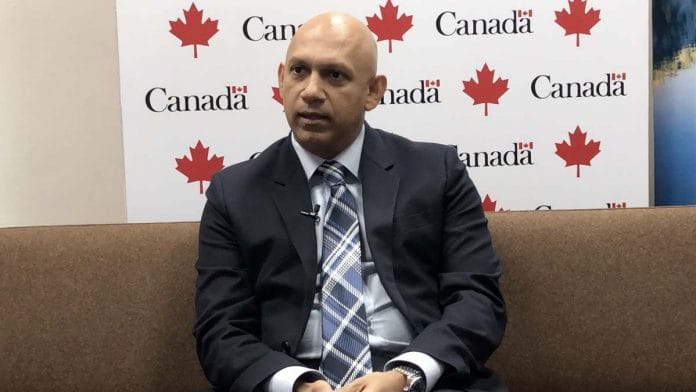New Delhi: Canada has brushed aside recent coldness in its relationship with India, and New Delhi and Ottawa are poised to take their bilateral ties to the next level by enhancing cooperation in trade and investment.
“The relationship (between India and Canada) has always been strong, long-standing and deep-rooted… 2018 and 2019 were record years across every metric in the relationship. We are now looking at expanding our relationship,” High Commissioner to India Nadir Patel told ThePrint in an interview.
According to Patel, in the last two years, two-way trade in goods between India and Canada have hit record numbers, crossing $10 billion compared to $6 billion five years ago, while trade in services has touched $2.5 billion.
Investment inflows from Canada, including portfolio investments, have crossed $40 billion now, compared to $4.5 billion in 2014, he added.
“So the relationship never really slowed down. In fact, it has strengthened. This is the time to see the momentum continue,” he added.
Also read: UK, US, Canada warn citizens against travelling in NE amid Citizenship Act protests
‘Khalistan criticism more than rhetoric’
Ties between India and Canada hit choppy waters when Prime Minister Justin Trudeau’s maiden visit to India in 2018 got mired in several controversies.
The visit came under widespread criticism with some calling it a “total disaster” when a Khalistani separatist was seen attending an event of the Canadian PM in Mumbai.
Later, Trudeau called his visit to India “the trip to end all trips”.
On the issue of Khalistani separatists, Patel said the Canadian government has made its position very clear on it.
“It (criticism on support to Khalistani elements) is more than rhetoric. Our government has made our position very clear on that. And it has not changed. We, of course, do not support or espouse any type of separation and we support the territorial integrity of India,” he said, adding that the security agencies of both countries collaborate closely with each other.
During Trudeau’s 2018 visit, he was given a cold shoulder by the Narendra Modi government as the prime minister did not receive him on his arrival and met him only at the fag end of his trip.
But Modi was also one of the first world leaders to congratulate Trudeau after he was re-elected in October last year.
Modi even tweeted, saying India is “looking forward to working together to further strengthen bilateral relations”.
Congratulations @JustinTrudeau!
India and Canada are connected by shared values and a strong commitment to democracy as well as plurality.
Looking forward to working together to further strengthen bilateral relations. pic.twitter.com/8zYvyuixCw
— Narendra Modi (@narendramodi) October 22, 2019
On CAA, Kashmir
The Canadian high commissioner said that during External Affairs Minister S. Jaishankar’s meeting with Canadian Foreign Minister François-Philippe Champagne in Ottawa last month both sides had discussed the issues of Kashmir and the controversial Citizenship Amendment Act (CAA).
“India and Canada are very close friends. Close friends can have an open and frank dialogue on any issue,” he said, adding that these issues have been discussed.
“We will continue to monitor the situation very closely,” Patel said, adding that the risk of escalation of tensions seemed to have died down.
On the CAA, Patel said issues such as respect for pluralism and human rights are an integral part of their foreign policy as well as in their relationship with India.
‘Work on trade and investment pacts needed’
Referring to the pending trade and investment pacts — Foreign Investment Protection and Promotion Agreement (FIPPA) and Comprehensive Economic Partnership Agreement (CEPA) — Patel said it will be beneficial for both New Delhi as well as Ottawa to have these agreements ready.
“Discussions had been going on for a long time. The reality is, more work needs to be done. Canada is a free and open trading nation. But more work needs to be done in terms of liberalising and opening more opportunities,” he said referring to the CEPA, the discussions for which began in November 2010.
India and Canada have locked horns on whether to sign the FIPPA first or negotiate it as part of the CEPA, with investments as a chapter in it.
“An investment protection agreement would help stimulate more investments. India has requested us to tie that investment agreement into our broader trade agreement. We think we can conclude something sooner and if that happens we will see a flow of investments from Canada to India even more. We are optimistic that we will be able to conclude something down the road, it is in the interest of both,” he added.
Also read: Akshay Kumar seeks Indian passport, says Canada citizenship was ‘plan B’ after 14 flops






